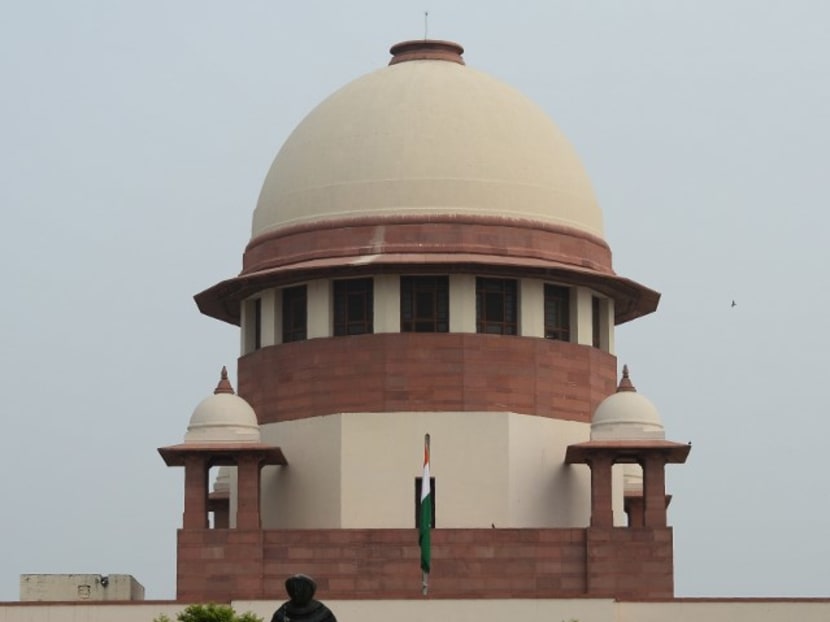India's supreme court deals blow to biometric ID system
NEW DELHI — Mr Narendra Modi’s plans to widen the scope of India’s vast biometric identification system have been dealt a blow by judges on the Supreme Court, who have ruled that Indians have a fundamental right to privacy.

India's Supreme Court. It ruled on Thursday (Aug 24) that citizens have a constitutional right to privacy, a landmark verdict that could have wide-reaching implications for the government's flagship biometric programme.Photo: AFP
NEW DELHI — Mr Narendra Modi’s plans to widen the scope of India’s vast biometric identification system have been dealt a blow by judges on the Supreme Court, who have ruled that Indians have a fundamental right to privacy.
The nine judges unanimously ruled on Thursday (Aug 24) that the Indian constitution granted citizens this right — a judgment that has far-reaching consequences for the government’s attempts to register the country’s 1.3 billion people.
The ruling was triggered by an appeal against the prime minister’s plans to make holding an identification card — known as an Aadhaar card — mandatory for claiming social welfare schemes.
The plans were part of a wider push to make the cards a prerequisite for a range of actions, such as filing tax returns, buying mobile phone SIM cards and buying train tickets.
Supporters of the scheme say that the Aadhaar card, which works using people’s fingerprints and iris scans, will help fix a range of problems by giving the millions of people who lack birth certificates a portable official identification. This will enable them to open bank accounts, take out loans, and claim benefits such as fuel subsidies that are currently being siphoned off by corrupt officials.
This week Mr Sanjiv Bajaj, managing director of lending group Bajaj Finserv, said the Aadhaar cards had helped cut his company’s minimum profitable loan size from US$400 (S$540) to $100. Linking Aadhaar cards to tax returns is meant to help reduce widespread tax evasion. India has an income tax base of 57 million people — just 4 per cent of the population.
Critics, however, say the Aadhaar scheme allows the government unprecedented access to citizens’ private data, and could give local officials even greater power over the lives of voters. They warn, for example, that an official with access to the Aadhaar database could freeze a person’s bank account and stop them claiming government services. As a result, campaigners petitioned the Supreme Court in July to block the government’s attempt to make the cards mandatory for claiming benefits.
The court said it must first decide on the wider question of whether the Indian constitution granted a fundamental right to privacy. The government argued that any right to privacy should be limited. Thursday’s ruling was not directly aimed at the Aadhaar scheme, but privacy activists said the decision would hamper government attempts to enforce digital registration.
Mr Prashant Bhushan, one of the lawyers who argued in favour of a right to privacy, said: “Any law passed cannot infringe upon the reasonable restrictions on your right to privacy. “If the government says Aadhaar will be required for travel and purchases then in my view these are unreasonable restrictions. It is a setback to the government.”
Despite the government’s previous position, Law and Justice Minister Ravi Shankar Prasad welcomed the judgement. “We welcome all the principles laid down by the Supreme Court in the #RightToPrivacy verdict,” he tweeted, adding: “Supreme Court has said that #RightToPrivacy is not absolute and is subject to reasonable restrictions.”
A smaller panel of judges will decide separately on whether the government can force benefits claimants to sign up for the identification scheme, or whether this would breach the newly enforced right to privacy. The judgment could also carry wider ramifications than just the Aadhaar scheme. In one paragraph, the court appears to undermine a previous ruling that homosexuality is illegal in India.
“Sexual orientation is an essentialt of identity. Equal protection demands protection of the identity of every individual without discrimination,” the ruling said. FINANCIAL TIMES





